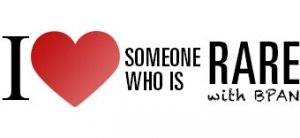Barriers in your mind
What does normal mean?
If you manage to read through our notes on this website from cover to cover, you might notice something: We never use the word normal when referring to Milly. During the first two years after Milly’s birth, when it became more and more apparent that something was wrong, I often heard “but she looks quite normal”. But how does one look normal? How do non-disabled people actually imagine a disabled person? Sitting in a wheelchair and with obvious abnormalities in appearance, facial expressions, gestures and/or behaviour in general?
Interestingly, the term normal is also predominantly used to refer to children. Nobody would think of making a distinction between non-normal and normal men, non-normal and normal women or generally non-normal and normal people. There is talk of normal schools, normal day-care centres, but not, for example, of normal employers. Why are disabled children denied being normal? Disabled children are NORMAL children, just like any other child. I find the use of the term normal unappreciative. Even among parents from the rehakids forum, one reads again and again: “whether my child will become normal one day”, “my child will attend a normal day-care centre”, “with normal children it is like this and like that” etc. It makes me sad when even parents of disabled children devalue their children in such a way. Just because one has not been able to develop certain abilities or can no longer perform them due to a disability and/or illness does not mean that one is not a full human being, because in my opinion that is what the use of this term ultimately boils down to. Every person is individually unique, there is no such thing as equality. So there can be no normality in relation to people.
In most cases, the word normal is not intentionally meant in a negative way. It is ultimately intended to highlight a difference between people. But please, not between normal and non-normal. On the other hand, I must admit, it is not so easy to find the right words. So how could one formulate the difference in a more appreciative way? My suggestion would be: best with the facts. If we say normal children, we actually mean healthy children or non-disabled children. If we want to emphasise “otherness”, we might say children with learning difficulties, physically handicapped children, mentally handicapped children, children with behavioural problems, children with speech delays, children with health problems, and so on. Why don’t we just say that? Instead of saying normal school, we can also say regular school and distinguish it from school for special needs. Our world and the people who live in it are so wonderfully diverse that the word normal in this context is completely out of place and so outdated.
